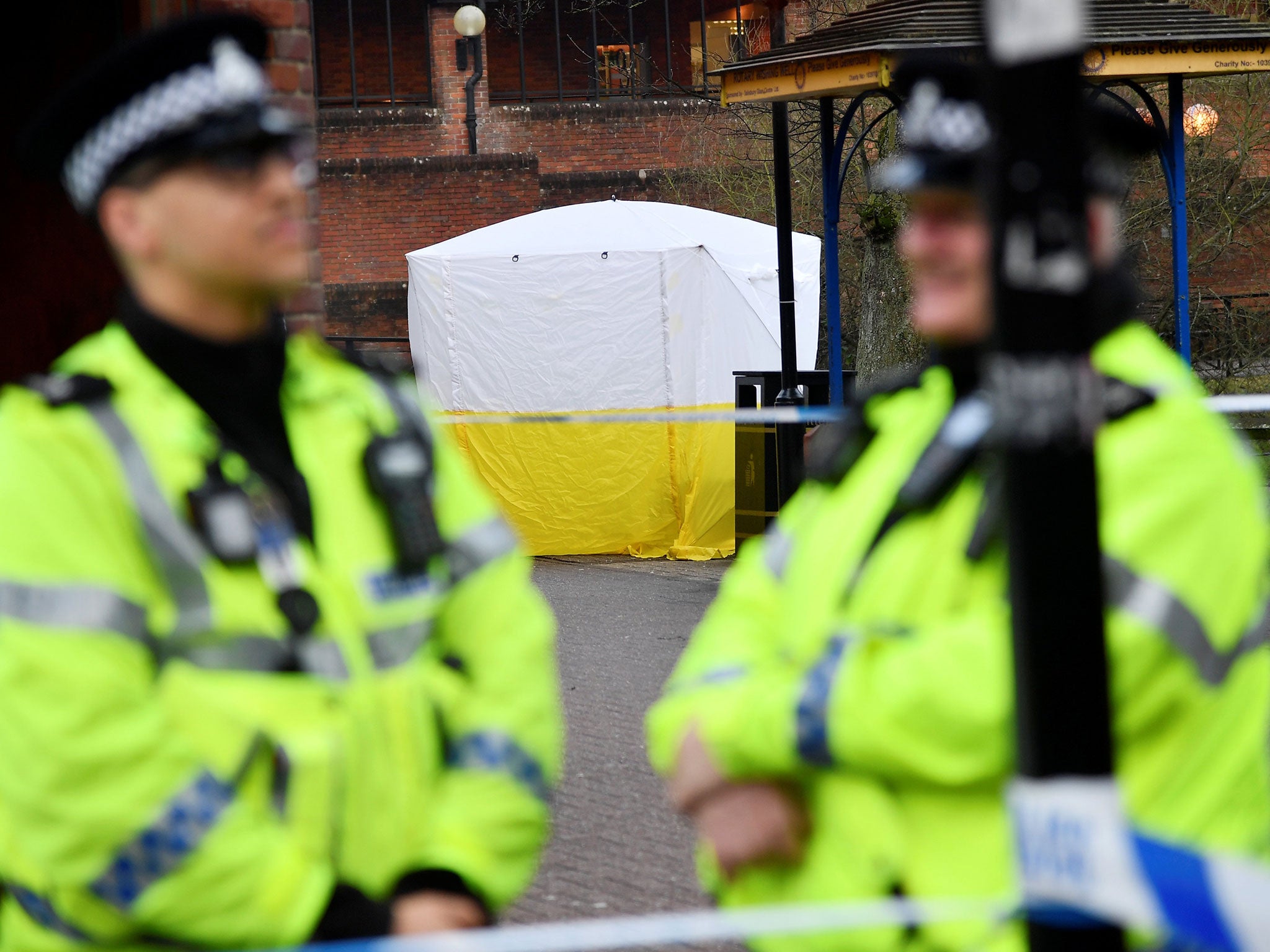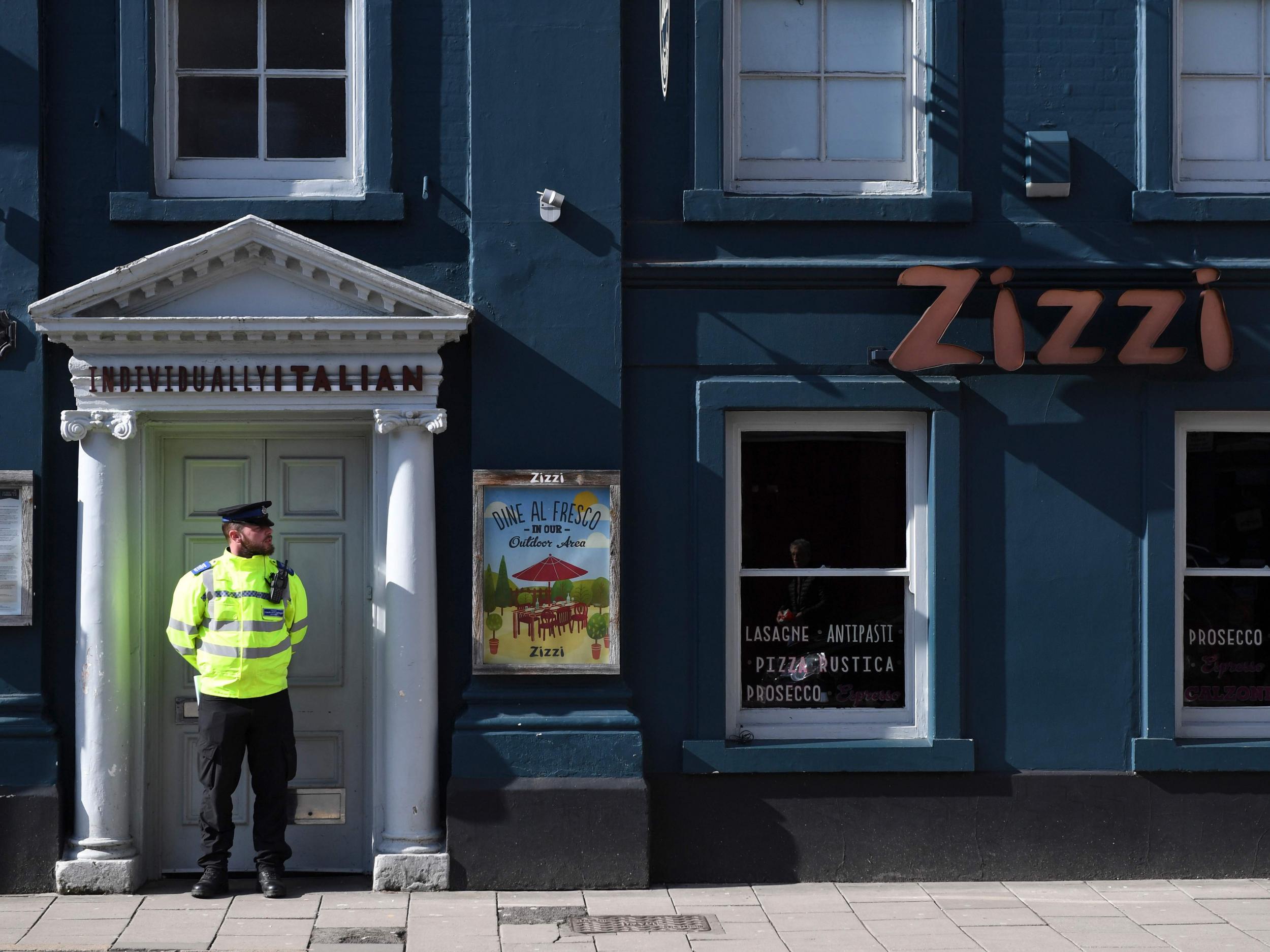Sergei Skripal: Boris Johnson warns Russia after apparent poisoning of MI6 double agent and his daughter
Sixty-six-year-old former spy is fighting for his life in a Wiltshire hospital
Your support helps us to tell the story
From reproductive rights to climate change to Big Tech, The Independent is on the ground when the story is developing. Whether it's investigating the financials of Elon Musk's pro-Trump PAC or producing our latest documentary, 'The A Word', which shines a light on the American women fighting for reproductive rights, we know how important it is to parse out the facts from the messaging.
At such a critical moment in US history, we need reporters on the ground. Your donation allows us to keep sending journalists to speak to both sides of the story.
The Independent is trusted by Americans across the entire political spectrum. And unlike many other quality news outlets, we choose not to lock Americans out of our reporting and analysis with paywalls. We believe quality journalism should be available to everyone, paid for by those who can afford it.
Your support makes all the difference.Boris Johnson has issued a warning to Russia following the alleged poisoning of a former MI6 double agent and his daughter, who are fighting for their lives in hospital.
“No attempt to take innocent life on UK soil will go either unsanctioned or unpunished”, the Foreign Secretary said, as he also accused Moscow of undermining the “fundamental basis of international order” by its past actions in Crimea and through election meddling.
Intelligence agencies updated the National Security Council on events in Salisbury as investigators raced to identify the “unknown substance” Sergei and Yulia Skripal were exposed to.
Counter-terror police took over the investigation because of the “specialist expertise” required but did not confirm speculation that Mr Skripal was targeted for turning against his country to spy for Britain.
It came as experts suggested fentanyl, ricin and sarin among the possible toxins used in the apparent assassination attempt.
Responding to an urgent question in the House of Commons, Mr Johnson said MPs would “note the echoes of the death of Alexander Litvinenko”, another former Russian spy who was poisoned with radioactive polonium in 2006.
“If those suspicions [of Russian involvement] prove to be well-founded than this Government will take whatever measures we deem necessary to protect the lives of people in this country, our values and our freedoms”, Mr Johnson added.
“I say to governments around the world that no attempt to take innocent life on UK soil will go either unsanctioned or unpunished.”
Branding Vladimir Putin’s government a “malign and disruptive force”, he said harsher international sanctions could be imposed if it is found to have had a hand in the attack on Mr Skripal.
He also suggested that British representation at the football World Cup to be held in Russia in July would not be able to “go ahead in the normal way”, but aides stressed that the Foreign Secretary was referring to dignitaries rather than the players themselves.
Some MPs demanded investigations into 14 deaths with potential links to Russian actors in the UK, while asking the Government to review how it protects allies like Mr Skripal.
The 66-year-old and his daughter, Yulia, were found unconscious on a bench in Salisbury’s Maltings shopping centre at 4.15pm on Sunday.
Suspicion turned to the Russian government, which jailed Mr Skripal for “treason”, or former spies he betrayed while working for MI6 during his time a colonel in the GRU military intelligence service.
He was given refuge in Britain after being exchanged in 2010 for Russian agents caught in the West as part of a Cold War-style swap in Vienna.
Among his opposites was former model Anna Chapman, who posted pictures online of herself on holiday in Thailand as the scandal deepened.
The Russian embassy characterised the reaction to his illness as a “a new phase of the anti-Russian campaign” in Britain and denied involvement by the Kremlin’s security services.
“Police or other British authorities have not provided the embassy with any official information regarding this incident,” a spokesperson said. “Media reports create an impression of a planned operation by the Russian special services, which is completely untrue.”
The Counter Terrorism Policing network took the lead in the investigation from Wiltshire Police as the situation developed on Tuesday because the “unusual circumstances” required its specialist expertise.

Assistant Commissioner Mark Rowley, the outgoing head of Counter Terrorism Policing, said the investigation was in its early stages and called speculation “unhelpful”.
“The focus at this time is to establish what has caused these people to become critically ill,” he added. “We would like to reassure members of the public that this incident is being taken extremely seriously and we currently do not believe there is any risk to the wider public.”
Mr Skripal was said to have lived a quiet life in a semidetached home in Salisbury, where he lived with his wife before she died in 2012.
The former spy was said to fear for his life after his son, Alexandr, died suddenly while on holiday in Russia last year, leaving Yulia his only living child.
Mr Skripal was excited for his 33-year-old daughter’s visit from Russia, recently telling a cleaner to ready a room for her at his home.
CCTV appeared to show the pair walking past a nearby gym just half an hour before police were called and officers are understood to be interviewing dozens of witnesses.
Officers cordoned off the bench, a branch of the Italian chain restaurant Zizzi and The Bishop’s Mill pub, where Mr Skripal and his daughter are believed to have eaten and drunk before falling suddenly ill.
They had no visible injuries and were taken to Salisbury District Hospital, where they remain in a critical condition in intensive care.
Wiltshire Police said they had been exposed to an “unknown substance” and several members of the emergency services were themselves taken ill after responding to the incident, with one still in hospital.

Freya Church, a 27-year-old local resident who saw the pair on the bench, said: “She [Ms Skripal] was leaning on him, slumped. She looked passed out and he was looking up, doing these hand movements. His eyes were glazed.”
One of the victims appeared to have vomited, while up to a dozen people at the hospital A&E department were also sick after they arrived, sparking a temporary quarantine.
Investigators have not confirmed the results of toxicology tests but experts said both nerve agents and the deadly synthetic opiod fentanyl could cause the symptoms.
Dr Patricia Lewis, research director for International Security at Chatham House, said the symptoms of respiratory difficulties, vomiting and eye irritation are shared by several toxins that could be administered in numerous ways with different timeframes for impact .
But she told The Independent that police should already have a “good idea” of what they were exposed to, adding: “The first thing they would do is try to get the antidote, because there are ways to treat them..
“Once they work out what it was they will be able to find traces of it anywhere else, because they will know what to look for, and they can work out the route and where it was administered.”
Only then will investigators be able to start narrowing down the field of suspects using witnesses and CCTV, although if Mr Skripal and his daughter regain consciousness they may be able to identify the attacker themselves.
Dr Lewis said ricin, a deadly poison that “can be made in someone’s bedroom”, is among the possible poisons alongside organophosphates like sarin, which can be transferred on clothing.
An even more powerful nerve agent, VX, was used to assassinate the brother of North Korean leader Kim Jong-un at Kuala Lumpur international airport last year but experts believe such an extreme and dangerous method an unlikely choice in Salisbury.
The polonium used to kill another spy, Litvinenko, was administered using a pot of tea but he did not die for several weeks and the method is now well-known.
Dr Jennifer Cole, an associate fellow at the Royal United Services Institute for Defence and Security Studies, said there would be “no reason” for a banned chemical weapon to be used when other toxins would have the same deadly effect.
She said the “most likely candidate” is a type of opiod like fentanyl, which has already been linked to numerous accidental deaths across the UK and US after being mixed with heroin.
American police and paramedics have fallen ill after responding to overdoses, while a gas based on fentanyl killed 130 hostages in a 2002 Moscow siege after Russian security forces tried to use it to subdue terrorists.
“Appears to be something fast acting, which would point to a chemical, and we know there’s Russian history of using agents which would have a similar effect,” Dr Cole said.
“Prohibited substances like VX are extremely difficult to get hold of and smuggle into a country, but something like fentanyl could be reasonably easily made up by someone who knew what they were doing.
“It could be administered in lots of ways – dropped into food or a drink, or injected.”
A former associate of Litvinenko, Yuri Felshtinsky, alleged the incident in Salisbury bears the hallmarks of a state-ordered assassination, while another spy swapped in the same deal as Mr Skripal urged caution. “There are lots of former security officers that deserted to the West,” Igor Sutyagin noted.
Litvinenko’s widow, Marina, said the news felt like “déjà-vu” as the long wait for justice over her husband’s death continues. “He must have thought he was safe,” she told The Independent. “He was not a defector, he was not attacking Putin, he kept a low profile, so why should he be a target?”

Join our commenting forum
Join thought-provoking conversations, follow other Independent readers and see their replies
Comments